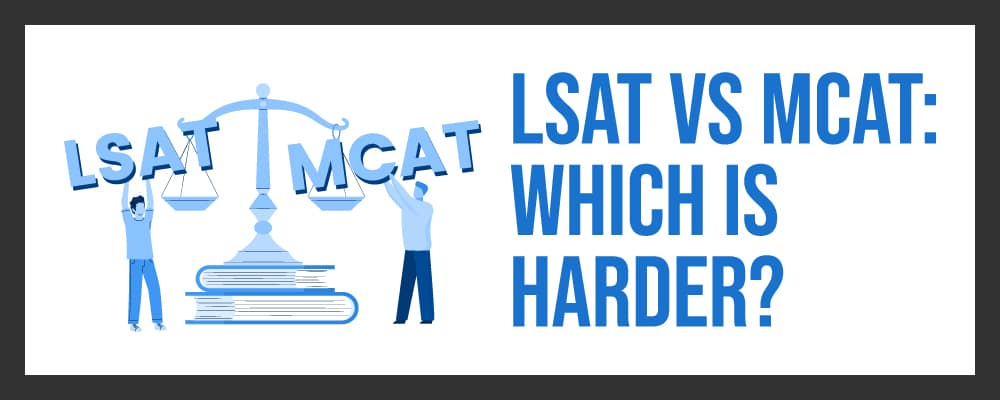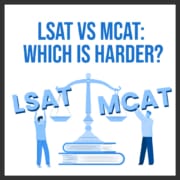
Are you standing at a crossroads and trying to decide between a career in law or medicine? If so, you’ve likely heard of the LSAT and MCAT. These exams are the gatekeepers to prestigious schools and career paths. But the question lingers – LSAT vs. MCAT: which one should you take?
After all, choosing the right exam isn’t just about picking a career. It’s also about recognizing where your strengths lie. The LSAT assesses your critical thinking and reasoning skills, while the MCAT delves into your science knowledge and understanding.
If you have an interest in both fields, the answer may come down to which one will be easier for you to ace.
The truth is, both exams can be difficult. According to a report by The Princeton Review, an alarming 50% of MCAT test takers end up retaking the test. Similarly, the average score for first-time LSAT takers is 150, but to gain admission to a top law school, it is recommended to achieve at least 165.
Although these exams are challenging, with the right preparation and strategy, they’re absolutely conquerable. So, buckle up as we guide you through the LSAT vs. MCAT journey.
Understanding the LSAT
The Law School Admission Test (LSAT) is a standardized test used by law schools in the United States, Canada, and a few other countries as part of their admission process. The exam focuses on assessing the candidate’s skills in critical areas of law, like reading comprehension, logical reasoning, and analytical reasoning.
What’s on the LSAT?
The LSAT is comprised of four sections:
- Reading Comprehension: This section tests your ability to understand complex texts, make logical deductions, and understand an author’s argument structure.
- Analytical Reasoning: This section measures your ability to understand relationships and draw logical conclusions about those relationships.
- Logical Reasoning (Two sections): This part assesses your ability to critically evaluate, analyze, and complete arguments.
- A Variable Section: This is an experimental portion that does not contribute to the test-taker’s final score. It is used by the Law School Admission Council to test potential questions for future exams and gather data on their performance before including them in the official test.
- Writing Section: The Writing Section on the LSAT is a separate portion from the multiple-choice test, and it is not scored on the traditional LSAT scale. Instead, it is sent to law schools along with the test taker’s application.
Each section is designed to simulate the type of thinking that lawyers need, ensuring that those who excel at the LSAT are likely to perform well in law school.
The Importance of the LSAT in Law School Admissions
Just like the SAT for undergraduate studies, the LSAT is a critical factor in law school admissions. Law schools consider LSAT scores because it’s a reliable predictor of first-year law school performance. A high score can help candidates stand out among other applicants, increasing their chances of admission to a prestigious law school.
Preparing for the LSAT

A strategic approach to LSAT preparation often involves taking advantage of various resources, such as LSAT review courses, personalized guidance from the best LSAT tutors, and expert advice from top LSAT admission consultants.
LSAT Review Courses: These courses provide a comprehensive study plan covering all sections of the LSAT. They include practice tests, study materials, and often offer strategies and tips for tackling the different types of questions on the LSAT.
LSAT Tutors: LSAT tutors offer personalized attention and can tailor the study plan to suit your strengths and weaknesses. They can help you understand complex concepts and provide strategies for efficient problem-solving.
LSAT Admission Consultants: LSAT admission consultants provide advice on the law school application process, including guidance on personal statements and interview preparation. They offer a broader perspective on how your LSAT scores fit into your overall application.
Utilizing these resources can enhance your LSAT preparation, increasing your chances of achieving a high score and gaining admission into a top law school.
Common Challenges in LSAT Preparation
The most common challenges faced by LSAT aspirants include time management, dealing with complex reading materials, and navigating the exam’s tricky logic games. Understanding the structure of the LSAT and practicing under timed conditions can help overcome these challenges.
Understanding the MCAT
Moving on from the LSAT, let’s dive into the MCAT.
The Medical College Admission Test (MCAT) is a computer-based standardized examination for prospective medical students in the United States, Australia, Canada, and the Caribbean Islands. It’s designed to assess problem-solving, critical thinking, and knowledge of natural, behavioral, and social science concepts and principles necessary for the study of medicine.
What’s on the MCAT?
The MCAT comprises four sections:
- Biological and Biochemical Foundations of Living Systems: This section tests your understanding of biological and biochemical concepts, the functions of the human body, and how our bodies respond to changes in the environment.
- Chemical and Physical Foundations of Biological Systems: Here, your knowledge about the principles of chemistry and physics applied to the human body and biological systems is tested.
- Psychological, Social, and Biological Foundations of Behavior: This section evaluates your understanding of the psychological, social, and biological factors influencing behavior and social issues.
- Critical Analysis and Reasoning Skills: This section mirrors the reading comprehension section of the LSAT, assessing your critical analysis and reasoning skills.
Each section represents a critical area of study in medicine, ensuring the exam is comprehensive and relevant to a medical career.
The Importance of the MCAT in Medical School Admissions
Similar to the LSAT’s role in law school admissions, the MCAT is a crucial determinant in medical school admissions. A high score on the MCAT signifies a student’s strong foundation in the necessary sciences and critical thinking skills. In addition, medical schools also consider GPA, extracurricular activities, and interview performance, but the MCAT remains a significant factor.
Preparing for the MCAT
Preparing for the MCAT requires dedicated study time and an understanding of the exam’s structure. This often includes taking practice exams, enrolling in an MCAT prep course, and studying subject areas extensively. It is recommended to start preparing for the MCAT well in advance of the test date.
Common Challenges in MCAT Preparation
Some common challenges MCAT candidates face include mastering a vast amount of scientific content, maintaining endurance for the long exam duration, and enhancing critical thinking skills. Thorough and systematic study, along with timed practice tests, can help to mitigate these challenges.
LSAT vs MCAT: Differences and Similarities
When comparing the LSAT vs MCAT, there are clear differences in the content, structure, and purpose of the exams. The LSAT focuses on assessing abilities in reading comprehension, logical reasoning, and analytical reasoning, which are critical to success in law school. On the other hand, the MCAT is more content-focused, testing knowledge of natural, behavioral, and social science concepts.
However, both tests share some similarities. Both are used for admission into graduate programs (law school for LSAT, medical school for MCAT), and both tests require extensive preparation. Both exams also assess candidates’ critical thinking and analytical skills, albeit in different contexts.
Which Exam is Harder: LSAT or MCAT?
The difficulty of the LSAT vs MCAT is subjective and depends on an individual’s strengths and interests. Some may find the MCAT more challenging due to its extensive scientific content, while others may struggle more with the LSAT because of its emphasis on logical reasoning and comprehension skills.
The Impact of LSAT and MCAT on Career Options
Scoring well on the LSAT opens the door to prestigious law schools, which can lead to opportunities in top law firms, judicial clerkships, or government agencies. Similarly, a high MCAT score can lead to acceptance into top-tier medical schools, paving the way for a promising career in various medical fields.
Factors to Consider in Choosing LSAT or MCAT
When deciding between the LSAT or MCAT, students should consider their career goals, interest in the subject matter (law or medicine), and readiness to commit to the extensive preparation that these exams require. It’s also important to consider which set of skills aligns more with your personal strengths.
Advice from LSAT and MCAT Achievers
High achievers on the LSAT and MCAT often stress the importance of consistent study, understanding the structure of the exam, taking numerous timed practice tests, and maintaining a positive and determined mindset. They also highlight the value of healthy lifestyle habits, such as regular exercise, adequate sleep, and proper nutrition during the preparation phase.
Conclusion
Choosing between the LSAT and MCAT is no small task. These exams are gateways to prestigious law and medical schools, and they require a considerable investment of time and effort. Keep in mind that the choice should align with your career goals, your strengths, and your interests. Regardless of which test you choose, proper preparation is key to achieving success.
Frequently Asked Questions
The difficulty of the LSAT and MCAT depends largely on the individual. The LSAT is more about critical thinking and logic, while the MCAT covers a broad range of scientific subjects.
Generally, you should aim for 200-300 hours of dedicated study time for either exam. However, this can vary based on individual learning pace and the score you’re aiming for.
While LSAT and MCAT scores are crucial, they aren’t the only factors considered. Schools also look at GPA, personal statements, letters of recommendation, and interviews.
Technically, you can take both tests. However, given the amount of preparation each requires, it’s advisable to choose one based on your career aspirations.
There are limits, but they’ve changed over time. As of the current rules, you can take the LSAT three times in a single testing year. For the MCAT, you can take it up to three times in a year, four times over two years, and seven times in a lifetime. However, policies may change, so always verify from the official websites.

Bryce Welker is an unstoppable force in the worlds of business and education. He’s a dynamic speaker, expert blogger, and a regular contributor to top-tier publications like Forbes, Inc.com, Business.com, and AccountingToday.com. With a proven track record of founding over 20 innovative test prep websites, Bryce has helped countless students and professionals pass their certification exams and achieve their dreams. Whether you’re seeking career advancement or educational success, Bryce Welker is the ultimate guide to help you get there.




